Wales news review: A year of extremes in 2022
 BBC
BBCIt has been a year of extremes in Wales.
From the worst storm in a generation to sweltering heat, with the two hottest days ever recorded.
There were also political storms, strikes and Wales welcomed refugees from the war in Ukraine that left us all facing a cost of living crisis.
It has also been a year of "getting back to normal" as Covid rules were lifted and we began to deal with the aftermath of a global pandemic.
Prime ministers came and went while the rest of us were stopped from going anywhere by rail strikes, cancelled flights, traffic jams and closed bridges.
Our sports stars suffered both agony and ecstasy, from gold at the Commonwealth Games, a shock return in rugby and 64 years of hurt brought to a wonderful end at football's World Cup that had us all humming a 40-year-old folk song.
The Urdd, Wales Today and Aberystwyth University all celebrated significant anniversaries while we said goodbye to two heroes of Welsh rugby and one of our most beloved actresses.
And, of course, we bode farewell to a monarch and welcomed a new king and a new Prince and Princess of Wales.
So what made the news in the past 12 months?
January
While Covid heroes and sports stars celebrated recognition in the New Year's honours, there was likely a few clearer heads than normal on New Year's Day as coronavirus still loomed large.
Nightclubs were closed, we were still wearing face masks and we all had to choose just who would be be in our 'group of six' for any social gatherings with First Minister Mark Drakeford at odds with Boris Johnson - remember him?
Their conflict was a continual theme right to the prime minister's departure in July.
For those stuck at home, a film about the campaign to save a Carmarthen cinema hit the small screen and leading Flintshire actor Jonathan Pryce would later receive a knighthood from the Queen.
February
While we battened down the hatches for Storm Eunice which caused widespread flooding and damage, Wales was shaken by three disturbing court cases.
A 19-year-old admitted killing his younger sister in a caravan park.
Three people, including a 17-year-old girl, were found guilty of murdering a doctor in a homophobic attack in Cardiff city centre park.
And 27 people were charged and 18 later put behind bars over the riot that took place in Swansea's Mayhill area the previous summer.

March
After we celebrated St David's Day, the arrival of spring brought plenty of reasons for optimism.
Our football fans were being revered for their signing, mischievous children rejoiced when smacking was made illegal and we were able to tear off our face coverings as Wales scrapped its last Covid restrictions.
The feeling of optimism failed to reach our national rugby team, beaten in Cardiff by Italy for the first time. Even worse was to come later in the year...
April
Lifting Covid restrictions sparked an Easter getaway in April, only for many holidaymakers to be grounded by airline staff shortages and a ferry link from Fishguard was also suspended after P&O sacked 800 staff.
The month also saw the mother of Logan Mwangi found guilty of the five-year-old boy's murder, alongside his stepfather and a teenage boy.
Pollution in some of our most beautiful areas of Wales raised its ugly head again with the emergence of a sewage-linked parasite in one of our rivers and human faeces on Snowdon.
Tory politician Jamie Wallis was praised after becoming the first MP to come out as trans but was later fined and disqualified from driving after failing to stop at the scene of an accident.
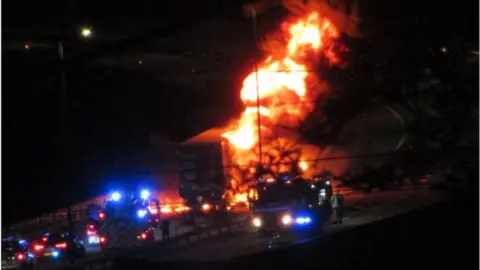 Jay Wagstaff
Jay WagstaffMay
Politics dominated the start of May as Wales went to the polls in local elections.
It would prove a disaster for the Tories who lost control of their only Welsh council - Monmouthshire - as Labour and Plaid Cymru made gains.
After more than two years, Wales had been the last part of the UK with Covid restrictions still in place - wearing masks in health settings - but we enjoyed "getting back to normal" as infection rates continued to decline.
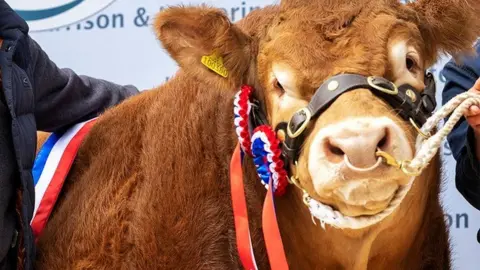 MacGregor Photography
MacGregor PhotographyWrexham was named Wales' seventh city to mark the Queen's Platinum Jubilee, however, hopes of also becoming the UK's next city of culture were dashed.
More than 200,000 fans flocked to Cardiff as Ed Sheeran played a series of gigs at the Principality Stadium, which sparked more travel problems.
June
It was a month of celebrations, sunshine and sadness.
The Queen's jubilee gave us all an extra bank holiday and street parties while Swansea-singer Bonnie Tyler and footballer Gareth Bale were among those honoured.
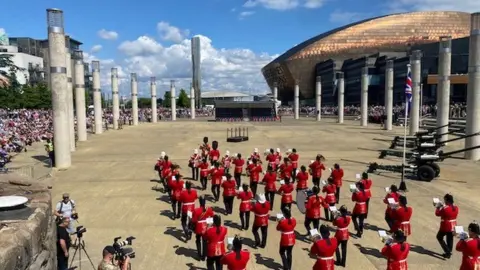
But the celebrations were later blamed for a rise in Covid cases across across the UK.
Ex-Wales rugby captain Ryan Jones was also honoured but the 41-year-old revealed a month later he had been diagnosed with early onset dementia.
The Urdd Eisteddfod celebrated its centenary, the Commonwealth Games baton landed on our shores having travelled the world and we all paused to commemorate the 40th anniversary of the Falklands War.
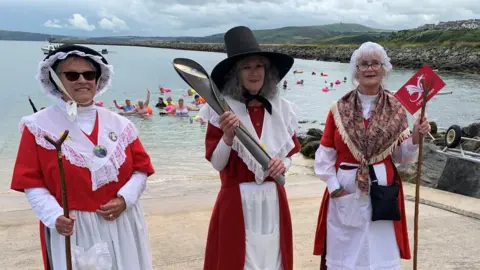
A human won the annual Man versus Horse race in Llanwrtyd Wells, Powys, for only the third time in the event's 42-year history.
Meanwhile Wales' footballers ended an even longer wait, beating Ukraine 1-0 in Cardiff to qualify for the World Cup in Qatar.
Wales was hit by the biggest rail strike in 30 years in a dispute that would last beyond the rest of the year.
Stereophonics and Sir Tom Jones rocked the Principality Stadium over two nights in Cardiff.
However, there was sadness at the passing of another icon when former Wales captain Phil Bennett, died aged 73.
Actor Michael Sheen best summed up a nation's grief when he tweeted: "A part of Wales has died."

July
Archaeologists uncovered evidence of prehistoric life dating back 10,000 years to the Ice Age during a dig under Pembroke Castle.
Boris Johnson's leadership also became history when he was forced to resign by several cabinet ministers, including Welsh Secretary Simon Hart, following a spate of controversies.
Temperatures outside Westminster got even higher as Wales baked in the hottest days ever recorded - with the mercury hitting 37.1C in Hawarden, Flintshire.
However, the weather did mean a warm return for both the Royal Welsh Show and National Eisteddfod after a two-year hiatus during the pandemic.
There was also a return to form for our rugby players who clinched a first Welsh win in South Africa while Gareth Bale confirmed a move to the United States.
August
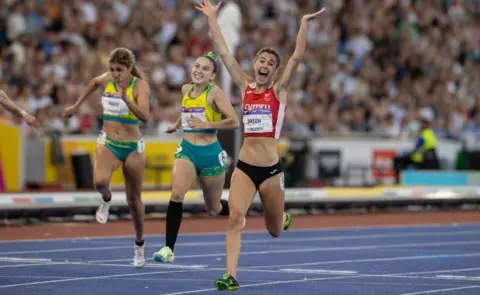 Getty Images
Getty ImagesThere was more sporting success at the Commonwealth Games in Birmingham where Wales ended with 28 medals, including eight golds.
But the month would also be dominated by the trial of ex-footballer and Wales manager Ryan Giggs.
There was no let up in the heatwave as drought in Pembrokeshire and parts of Carmarthenshire saw a first hosepipe ban in Wales for more than 30 years.
Top grades at A-level dipped from 2021 after pupils sat summer exams for the first time in three years and a novel inspired by the last man to be hanged in Cardiff 70 years ago was named the Wales Book of the Year.
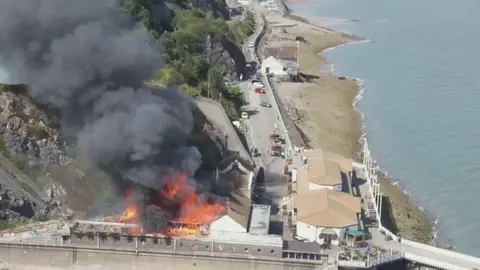 South Wales Police
South Wales PoliceSeptember
Liz Truss was appointed prime minister, though she resigned after just 45 days in office.
Of more significance was the death of Queen Elizabeth II, the UK's longest-serving monarch, who died at Balmoral aged 96 after reigning for 70 years.
In his first address following the death of his mother, King Charles III named Prince William and his wife Catherine as the new Prince and Princess of Wales.
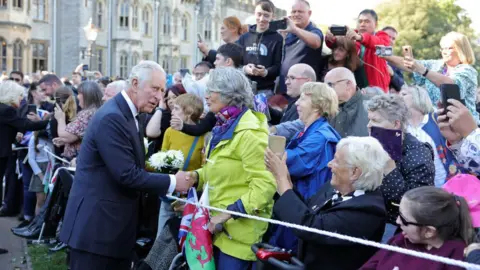 Getty Images
Getty ImagesTony Paris, one of the three men wrongly convicted of the 1988 murder of Cardiff woman Lynette White in a notorious miscarriage of justice, died.
Welsh rugby lost another former captain and a legendary broadcaster when Eddie Butler died during a charity trek in Peru, aged 65.
While more revelations over the condition of the plane that crashed, killing footballer Emiliano Sala and pilot David Ibbotson in 2019, emerged.
October
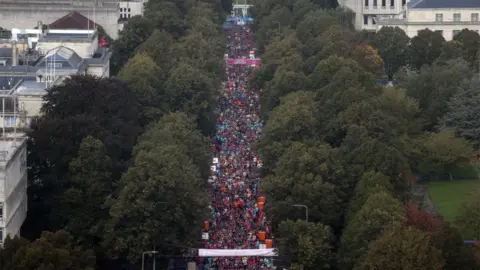 Cardiff Half Marathon
Cardiff Half MarathonThe month was one of very different discoveries, particularly along the west Wales coast.
Police found a large haul of drugs that washed up on a beach near Aberystwyth.
Further out to sea, a fisherman named Batey, was celebrating the biggest fish ever caught in Welsh waters - a giant 900lb (408kg) tuna.
There was another - more gruesome - discovery when the remains of more than 240 people were unearthed by archaeologists under a department store in Pembrokeshire.
The year's third prime minister, Rishi Sunak, appointed Monmouth MP David TC Davies as Welsh secretary while police in Gwent unveiled their latest quirky crime-busting tool - three Tuk Tuks.
Tempers flared during a north Wales football derby that saw seven red cards during a mass brawl and First Minister Mark Drakeford also lost his cool during a Senedd debate.
Motorists and businesses in north Wales could have been forgiven for feeling anger over the continued closure of the Menai Bridge.
A man and girl were injured on the rollercoaster at Oakwood Theme Park in Pembrokeshire, and indie rock band Adwaith became the fist act to win the Welsh Music Prize for a second time.
November
Gwent Police found itself being investigated after "abhorrent" messages between serving and retired officers emerged.
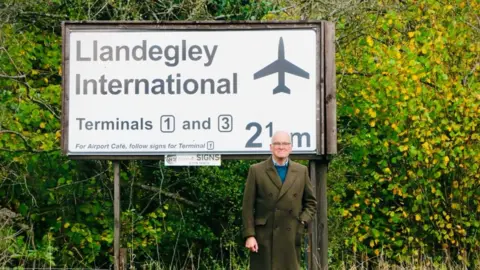
People across Wales took to the streets during the COP27 summit calling for "climate justice" and then on the UK's warmest Remembrance Sunday ever recorded - 21.2C (70.2F) in Porthmadog, Gwynedd.
A change in ownership of a Newport microchip factory was deemed a national security risk while a change in policy will see Wales' highest mountain referred to by its Welsh name Yr Wyddfa.
Racehorse owner Dai Walters and trainer Sam Thomas had lucky escapes from a helicopter crash near Ruthin.
 Huw Ab Tegwyn
Huw Ab TegwynNovember also saw football history made.
Despite the cost and concerns over Qatar's human rights record, fans still travelled to watch Robert Page's team play at the World Cup for the first time since 1958.
It ended in disappointment after the team failed to progress beyond the group stage, but that didn't stop us getting Yma o Hyd tattoos.

Even Hollywood actor - and Wrexham FC owner - Ryan Reynolds was speaking Welsh at awards ceremonies.
However, figures showed the number of people speaking Welsh has fallen in the past decade, particularly among children.
 Getty Images
Getty ImagesDecember
A quick freeze had us finally switching on the heating but also raised concerns in Wales' most deprived areas as the cost of living crisis continued to hit households and businesses.
The death of seven-year-old Hanna Roap from Strep A sparked a public health fears among parents, though nurses went on strike for the first time in NHS history - swiftly followed by paramedics.
Wales' largest health board became subject of a £122m fraud investigation and South Wales Fire and Rescue Service also underwent a review following allegations of misconduct.
Christmas cards were late due to a postal strike while holiday travel was hit by industrial action by both rail workers and airport staff.
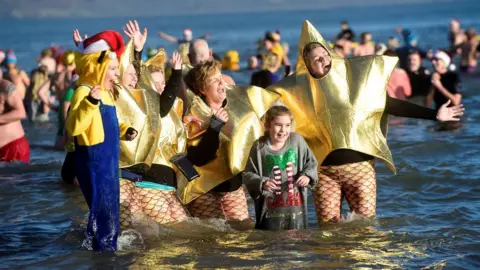 REBECCA NADEN/Reuters
REBECCA NADEN/ReutersThere was better news for Wales' national symbol when leeks were given special protected status and the story of identical twins who spoke to no-one but each other became a film.
Wrexham FC's Hollywood owners were given the freedom of the city and would be two of the few people who could afford to buy a house on a street in Abersoch - named the most expensive in Wales.
Thousands of homes spent Christmas without water while hundreds of other people were braving the chill for the festive sea dips around Wales to round-off another eventful year.
What does 2023 hold in store?
